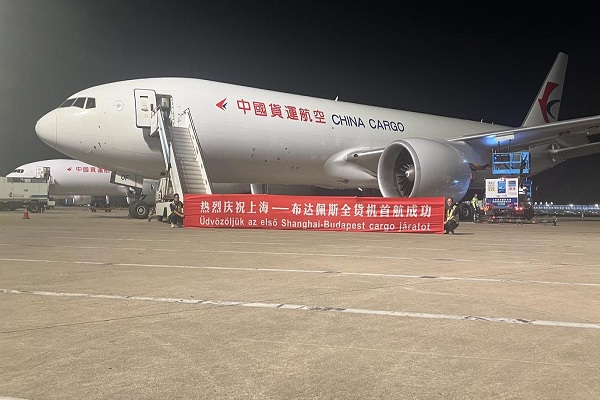Shanghai gains traction as financial hub
"Although the joint venture has proceeded a little bit behind schedule due to the novel coronavirus, the businesses have been moving ahead normally. The new securities business department in Shanghai was approved in mid-February and the license was obtained one month later," said Toshiyasu Iiyama, head of the China Committee of Nomura Holdings.
Iiyama said the revolutionary development going on in the Chinese capital market bears much resemblance to the opening-up of the Japanese financial market in the 1990s. As the Chinese financial and capital markets connect closer with global financial markets, more international financial leaders will make their presence in the Chinese market, which in the long run will push forward the further evolution of the Chinese financial market.
"Shanghai has always stood on the front line of innovation and the local government can always truly implement innovative policies. This is one of the major reasons for establishing the joint venture here. As companies and investors further diversify in Shanghai, capital flow in the city will be much smoother," he said.
Much effort has been made by the Shanghai government to make the business environment more friendly. On March 31, a bilingual guidance for overseas asset management institutions planning to invest in Shanghai was released. The Shanghai Asset Management Association, one of the compilers, said in the guidance that overseas asset management firms are welcome to start operations in the city to provide more diversified asset management services to Chinese investors.
Li Tao, general manager of Fullerton Investment Management (Shanghai) Co Ltd, has also been impressed by the Shanghai government's efficiency, especially during the contagion period. The Singapore-based investment firm was named a qualified domestic limited partner in mid-March, which was quite beyond its expectations.
Foreign asset management firms previously had to set up a new entity for each new business, which cost quite a bit. But such requirements were removed in Shanghai in late 2018. According to the Shanghai Financial Regulatory Bureau, wholly foreign-owned enterprises for private fund management only need to change their operational scope with the industry and commerce department for any new qualified domestic limited partnership, or QDLP business, Li said.
"While foreign asset management firms are still quite small in scale in the eyes of municipal regulators, they are just as valued. When it comes to some untouched areas, the municipal government will help foreign firms innovate and explore solutions. On the other hand, an asset management firm cannot label itself as 'international' if it does not have operations in China, especially in Shanghai," he added.
The endeavors of the Shanghai government have paid off.
In the Global Financial Centers Index (GFCI 27), jointly released by the Shenzhen-based China Development Institute and United Kingdom-based independent think tank Z/Yen Partners in late March, Shanghai moved up one place to rank as fourth among world financial centers. The 3,360 respondents polled for the index showed the most confidence in Shanghai's increasing competitiveness when compared to the other top three financial centers of New York, London and Tokyo.
According to the Shanghai Financial Regulatory Bureau, a total of 72 international financial institutions in the city have been approved as qualified foreign limited partners, or QFLPs, and another 44 as QDLPs. The world's top 10 asset management companies have all started operations in Shanghai. Among the 25 wholly owned foreign private equity firms registered with the Asset Management Association of China, 24 have set up offices in Shanghai.
Global management consultancy Oliver Wyman estimated in its latest report that the Chinese market's contribution to foreign financial institutions' worldwide income in asset management, wealth management and securities will be 6 percent, 5 percent and 5 percent, respectively, by 2023.
Jackson Lee, head of global asset management firm Fidelity International in China, holds a positive outlook on China's asset management market, whose value is expected to more than quadruple over the next 10 years.
Based on these expectations, Fidelity International opened an office in Shanghai in 2004, which was the company's first foray into the market. In 2017, Fidelity became one of the first wholly foreign-owned enterprises for private fund managements in China. At present, the US firm is preparing to apply for mutual fund qualification.
"We set up a research center in Shanghai in 2011 by which time we had a team of equity researchers in the city. It is with the help of the municipal government that we are able to set up our fund management team here," Lee said.
In 2015, Dutch asset management firm Robeco established a wholly foreign-owned enterprise in Shanghai, which was one of the first international asset managers to obtain such a license. Lu Jie, general manager of Robeco Shanghai, said the enterprise made up an important part of the group's 2014-18 strategy given the accelerated financial opening-up in China. As the company's institutional clients around the world have shown increasing interest in the A-share market, Robeco has also built a team in Shanghai responsible for A-share research, Lu said.
The strong professional financial talent pool in Shanghai has made possible foreign financial institutions' sustained development in the city and in China.
"Foreign firms, such as our own, often have to hire talented people with financial and language capabilities, and an understanding of international compliance standards. We have seen a huge improvement over the last couple of decades in this area and the key reason is China's opening up," Lu said.
To Robeco, the investment rule has always been looking at the "fastest-growing nations of the world". Lu said the attraction of emerging markets is highly compelling in the long run, which is the reason why Robeco sped up its strategy in China over the past few years.
"We believe we are well-positioned to tap into the potential that the market has to offer," he said.

